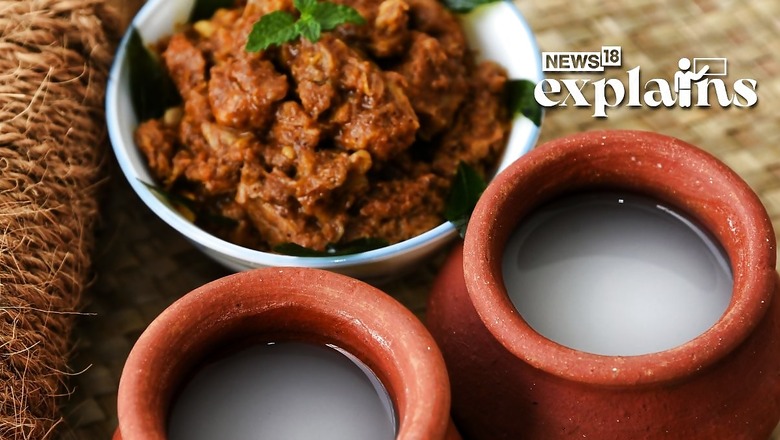
views
The death toll in Tamil Nadu’s hooch tragedy in two northern districts increased to 14 on Monday and 51 people who consumed the poisonous brew were being treated in various hospitals, the government said.
After visiting those being treated at Villupuram government medical college hospital, Chief Minister M K Stalin told reporters here that investigation into the matter would be transferred to the CB-CID and he assured tough action.
According to preliminary police probe, use of methanol by illicit brewers has led to the tragedy.
Calls Against Illegal Liquor
AIADMK chief and Leader of Opposition, K Palaniswami said he had spoken in Assembly on increased “illicit liquor” availability in Tamil Nadu. Had the government taken appropriate action, such incidents could have been averted.
“Chief Minister Stalin is fully responsible. He should resign from his post, he is an inept CM,” he told reporters in Tiruchirappalli. He alleged deterioration of law and order situation in the state. BJP state chief K Annamalai also slammed the ruling DMK over the issue.
After consuming illicit liquor, nine persons died in Villupuram district and five others in Chengelpet district.
The nine persons belonged to Ekkiyarkuppam fishing village near Marakkanam in Villupuram district. In Villupuram, 40 persons are being treated at the medical college hospital here at Mundiyampakkam. Three others were being treated at JIPMER Hospital and another person at Puducherry government hospital.
Stalin said in Chengelpet district’s Perunkaranai village five persons died after drinking illicit brew and seven persons were being treated at the Chengelpet government medical college hospital.
In both Villupuram and Chengelpet, methanol was used to make the brew and empty bottles of alcoholic beverages sold in state-run TASMAC stores were used in Chengelpet to fill the illicit liquor.
“I have ordered Rs 10 lakh solatium to the kin of the deceased in the two incidents. To those who are being treated, Rs 50,000 assistance has been provided.” Illicit brewers behind the two incidents have been arrested and all steps were being taken to arrest all those responsible, he said.
What Makes Methanol Deadly?
Methanol has been the poison in every hooch disaster in India’s – and the world’s – history since 1945, as per a report by the Wire. Most doctors in most nations incorrectly infer that the culprit is chloral hydrate, and therefore offer ineffective treatments, as per the publication.
James Manor writes for the publication that it is critical that doctors and nurses are made aware that the problem is always methanol, and that the antidote to methanol is ethanol. This may seem unusual, he says, but after consuming lethal methanol, the only effective treatment is to have the victim ingest as much safe alcohol (ethanol) as possible. This is because ethanol successfully competes with methanol for an enzyme in the body that breaks down methanol into numerous components, including formaldehyde, which kills, blinds, and cripples individuals. If ethanol is consumed, the methanol will not degrade and will travel through the body safely.
Many lives would be spared, and horrific injuries would be avoided, if every doctor and nurse in India understood nine crucial words, as per Manor: the poison is methanol, and the antidote is ethanol.
Tamil Nadu’s Alcohol Problem
According to a Crisil survey, the state leads in alcohol use, accounting for 13% of overall alcohol consumption in the country, as per a Hindu report. The Tamil Nadu State Marketing Corporation, or TASMAC, controls all spirits sales and sells 1,60,000 cases of IMFL and 90,000 cases of beer per day. (IMFL, or Indian Made Foreign Liquor, refers to all hard alcohol, including whisky, brandy, rum, gin and vodka.)
Despite the fact that alcoholism is a huge social problem, the conditions under which alcohol is supplied and consumed at government-controlled shops are dismal, with no dignity afforded to either customers or personnel, the report argues.
Given the low pay and poor working conditions, corruption and malpractice are common at the stores. The sales crew engages in a variety of illicit acts, including overcharging customers, incorrect billing, and alcohol dilution. Selling ‘cuttings’, slang for spirits sold by the peg rather than in sealed bottles, is a frequent side hustle, as per the report.
History
It was in Salem district of Tamil Nadu in 1937 that the Congress government of C. Rajagopalachari imposed prohibition, a first in the country. It was extended across the state in 1948 immediately after Independence.
This prohibition in Tamil Nadu continued with Kamaraj at the helm of affairs in the state.
The Madras Abkari Act was introduced in 1886 that placed strict regulations and banned the sale of local liquor. This British policy helped the sale of foreign liquor instead of ‘desi’ beverages.
The DMK government led by party ideologue M. Karunanidhi, lifted the ban in 1971 citing revenue loss without a nationwide ban, and allowed the sale of arrack and toddy — the ‘desi drinks’. However, Karunanidhi had to stop the sale of toddy and arrack in 1974.
The ban on arrack and toddy led to the manufacturing of spurious drinks and methanol, the industrial alcohol, was widely used leading to several deaths in the state in 1975-76. The sale of liquor and toddy was later reintroduced in the state by matinee idol turned chief minister, M. G. Ramachandran ( MGR) when he was catapulted to power as an AIADMK leader in 1981.
MGR even reduced the age for securing a liquor permit for foreign liquor consumption from 45 years to 30 years. In 1981 finance minister V.R. Nedunchezhiyan further reduced the age to 25.
In 1983, the state government under MGR, set up the Tamil Nadu State Marketing Corporation (Tasmac), and the sale of Indian Made Foreign Liquor (IMFL) and arrack were brought under it. Six years after the sale of arrack and toddy began, the MGR government banned local drinks on January 1, 1987, as per a 2022 report by IANS.
Politicians of all hues while in power in Tamil Nadu justify the sale of liquor saying that the revenue generated through huge taxation on liquor is being used to support social welfare schemes that have led to a robust social index for the state.
Gandhian activist M. Idiyanarayanan told IANS: “It is a wrong theory that you sell liquor, make money by charging the tipplers heavily and use this money for welfare schemes.”
“Welfare is a state subject and the money for that must not be generated through liquor; instead, policymakers must look to other avenues for raising money. Liquor is evil and the government must refrain from generating funds through liquor sales, creating disharmony in the society.”
With inputs from PTI, IANS

















Comments
0 comment